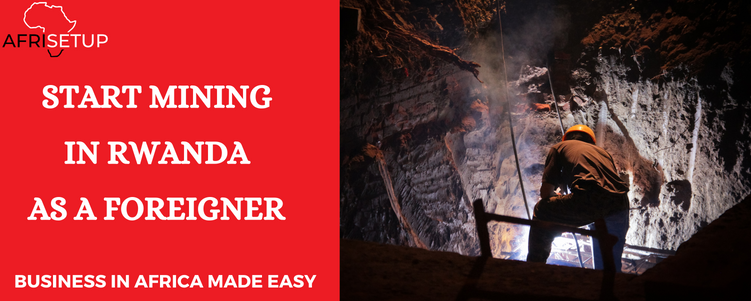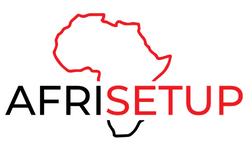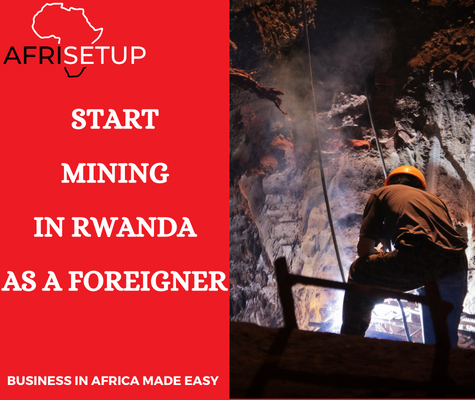- By afrisetupconsultants
- Uncategorized
- 0 Comment

Start Mining in Rwanda – Mining operations in Rwanda commenced in the early 1930s, and since then, the sector has undergone significant reforms, emerging as the country’s second-largest revenue generator. Rwanda ranks among the world’s leading producers of tin, tantalum, and tungsten (3Ts), alongside exporting gold and gemstones. Additionally, Rwanda boasts a diverse range of minerals including silica sands, kaolin, vermiculite, diatomite, clays, limestone, talcum, gypsum, and pozzolan. Small-scale mining constitutes approximately 80 percent of Rwanda’s mineral output.
- At Afrisetup, we’ve been assisting both local and foreign investors in tapping into Rwanda’s market and seizing the abundant opportunities it offers. Whether you’re looking to Start a business in Rwanda or start mining in Rwanda or to explore prospects within the mining sector, feel free to reach out to us today. Remember, the first step to get started is by registering your mining company in Rwanda.
More about the Rwanda mining industry before you Start Mining in Rwanda
The mining industry in Rwanda is a significant sector contributing to the country’s economy. Rwanda is rich in various mineral resources, including tin, tantalum, tungsten, and gold, among others. The government has made efforts to attract investors to start mining in Rwanda through favorable policies and regulations, leading to increased exploration and extraction activities. One notable initiative is the Rwanda Mines, Petroleum, and Gas Board, which oversees the sector’s development and ensures compliance with environmental and social standards.
Rwanda Mining Board
The mining sector in Rwanda is regulated by the Rwanda Mining Board. It is the body responsible for offering Licensing, exploration, investment, and other mineral-related services. It is a government agency established by the presidential order to regulate and manage mineral, quarry, oil, and gas resources in Rwanda. It has the mission, responsibilities, powers, organization, and functioning of the board.
The Rwanda Development Board negotiates mining license contracts on behalf of the Government of Rwanda and the Rwanda Mining Association can provide further resources.
NOTE: As a foreigner looking to start mining in Rwanda, it is important to familiarize yourself with these regulatory bodies so that you can stay compliant while carrying out your day-to-day operations. Let us assist you in registering your mining business in Rwanda.
Minerals in Rwanda | Mineral Resources in Rwanda
Before you start mining in Rwanda, it is crucial to familiarize yourself with some of the opportunities in Rwanda mining.
Here are some of the key mineral resources found in Rwanda:
- Tin: Rwanda is one of the world’s top producers of tin. The country’s tin deposits are found mainly in the northern and western parts of the country.
- Coltan: Rwanda also has significant coltan reserves. Coltan is a vital mineral used in electronic devices, particularly in the production of capacitors.
- Tungsten: Tungsten is another important mineral resource in Rwanda. It is used in various industries, including electronics and manufacturing.
- Gold: While gold deposits in Rwanda are not as extensive as in some neighboring countries, there are still significant gold reserves, particularly in the western part of the country.
- Cassiterite: Cassiterite, the primary ore of tin, is abundant in Rwanda and contributes to the country’s tin production.
- Wolframite: Wolframite is another tungsten-bearing mineral found in Rwanda, contributing to the country’s tungsten output.
- Rare Earth Elements (REEs): Rwanda has potential reserves of rare earth elements, which are crucial for various high-tech applications.
- Quartz: Rwanda has substantial quartz deposits, which are utilized in industries such as glassmaking and electronics.
N/B – Efforts have been made to develop the mining sector in Rwanda so that the country can use its resources well and help its economy grow. The government has put in place rules to attract investors to the mining industry while also taking care of the environment and helping local communities. Also, steps have been taken to make mining better by improving infrastructure and policies to make sure mining is done responsibly and helps Rwanda develop. Start Mining in Rwanda today and be part of the success.
Mining sites in Rwanda
There are several mining sites in Rwanda. The Rutongo Mines, situated 26 km north of Kigali, consists of six underground mines: Gisanze, Masoro, Nyamyumba, Gasambya, Karambo, and Mahaza. With a 25-year license beginning in 2015, the mines are estimated to produce 54,000 tonnes of recoverable tin. The New Bugarama Mine is situated in the North of Rwanda. It is also one of the oldest Tungsten mines in the country.
Mining law in Rwanda
Since 2018, the mining sector in Rwanda, including exploration and exportation, has been regulated by Law 58/2018 of 13 August 2018, known as the Mining and Quarry Operations Law (referred to as the “Mining Law”). This legislation has been further enhanced by additional presidential orders, ministerial orders, and regulations established by the RMB. Together, these laws and regulations establish a thorough legal structure that oversees the licensing procedure and outlines the responsibilities and privileges of license holders.
List of mining companies in Rwanda
Rwanda has seen a burgeoning interest in its mining sector, with several companies venturing into the country to begin mining operations. Among the notable entities are
- Well Commodity Rwanda Ltd
- COMIKAGI
- ST Simion Metals Company Ltd
- Hillside Mining Company Ltd
- MINEXX Capital Rwanda
- Good World International Co. Ltd
- SEAVMC Ltd etc
These companies span various sectors, from traditional mining giants to innovative ventures embracing modern technologies. With Rwanda’s commitment to fostering a conducive environment for mining investments, newcomers aiming to start mining in Rwanda have a wealth of options to explore.
Methods of mining in Rwanda
In Rwanda, there are several methods of mining employed to extract valuable minerals from the earth. Before you start mining in Rwanda take note of these mining methods:
- Artisanal and Small-Scale Mining (ASM): This is a common method in Rwanda, involving individuals or small groups working with simple tools to extract minerals. ASM is often associated with informal and manual labor, and it plays a significant role in the country’s mining sector.
- Open-Pit Mining: This method involves extracting minerals or metals from the surface by removing the overlying material. Open-pit mining is often used for minerals such as tin, tantalum, and tungsten in Rwanda.
- Underground Mining: In cases where minerals are found at deeper levels, underground mining methods are employed. This involves creating tunnels and shafts to access the deposits. Rwanda has some underground mining operations for various minerals.
- Alluvial Mining: This method is used to extract minerals, particularly tin, from alluvial deposits. It involves washing sediments and gravels to separate the heavy minerals, such as cassiterite (tin ore), from lighter materials.
- Quarrying: Quarrying is the extraction of construction materials, such as sand, gravel, and stone. It is an essential aspect of the mining industry, supporting infrastructure development. Quarrying is prevalent in Rwanda for materials used in construction.
Advantages of starting a mining company in Rwanda
Starting a mining company in Rwanda offers several advantages, including:
- Sustained Economic Growth – The mining sector in Rwanda is a sector highly supported by the government, thus preventing it from collapsing in the future.
- Robust Governance – The sector is regulated and monitored by various agencies which provide the proper guidance and strategies for maintaining the sector.
- Investor Friendly Climate – The sector is open to both foreign and local investors who are free to invest and benefit from this multibillion-dollar sector.
- Access to markets – Rwanda is a strategic location for the mining sector as it gives a direct market to the neighboring East African Countries such as Congo which is also a key market player in the mining industry.
- Excellent Labor Market – Rwanda has a favorable labor market and labor laws which makes it easy to hire both foreign and local employees.
- Untapped investment opportunities – The mining sector in Rwanda offers a wide range of untapped opportunities in areas such as value addition and industrial mining since the sector is currently traditional.
NB: Start mining in Rwanda today and enjoy these advantages as a foreigner.
FAQs
- What is the contribution of the mining sector in Rwanda? The mining sector in Rwanda significantly contributes to the country’s economy by driving GDP growth, generating revenue through taxes and exports, providing employment opportunities, and stimulating infrastructure development. It helps diversify Rwanda’s economy and reduces dependence on traditional sectors like agriculture.
- What is the GDP of Rwanda mining? GDP from Mining in Rwanda averaged 30.39 RWF Billion from 2006 until 2023
- How does the government support the mining industry?
The government supports the mining industry through various means, including:
- Legislation and Regulation: Enacting laws and regulations to govern mining activities, ensuring environmental protection, safety standards, and fair labor practices.
- Financial Incentives: Providing tax incentives, subsidies, and grants to encourage investment in mining projects, exploration, and infrastructure development.
- Infrastructure Development: Investing in infrastructure such as roads, railways, and ports to facilitate the transportation of mined materials.
- Research and Development: Funding research initiatives to improve mining technologies, safety, and environmental sustainability.
- Trade and Export Assistance: Assisting mining companies with export opportunities, trade agreements, and diplomatic support to access international markets.
- Community Development: Implementing programs to ensure that local communities benefit from mining activities through employment, infrastructure, and social development initiatives.
N/B- Overall, government support for the mining industry aims to balance economic growth with environmental and social responsibility.
4. Where is gold mined in Rwanda? There are known deposits of Gold in the Nyungwe, Miyove, Byumba, Rusizi, Nyamasheke, and Nyamagabe districts.
5) What rare earth minerals are found in Rwanda? Rwanda has some rare earth minerals such as Cassiterite, Colombo tantalite, and Wolframite.
7) What is Rwanda rich in? Rwanda is rich in tin, tantalum, and tungsten.
8) Does Rwanda have diamonds? Yes, Micro-diamonds are mined in Gatebe in Gicumbi district.
9) What are the precious stones in Rwanda? The precious stones found in Rwanda include amphibolite, granites, quartzite, volcanic rocks, clay, sand and gravel
CONCLUSION
The mining sector in Rwanda is a multi-billion sector and it possesses numerous untapped opportunities. The role of the government through the different regulatory bodies ensures that all stakeholders’ interests are taken into consideration. The sector requires innovations and inventions, which can only be realized by massive foreign investment which is currently lacking since most of the players are not formalized. Contact us today to start mining in Rwanda!

